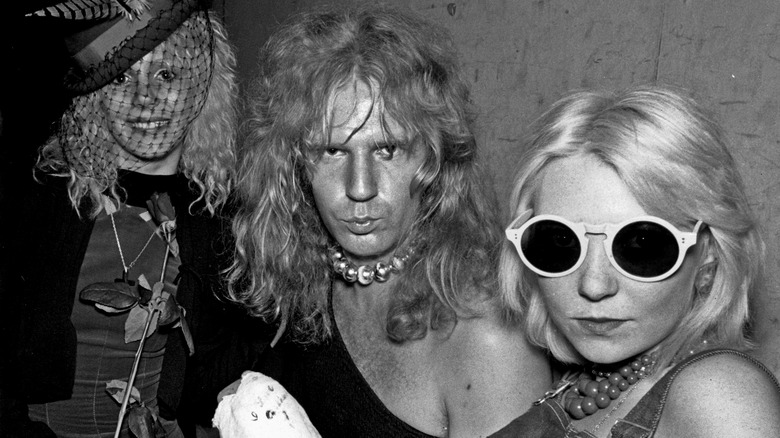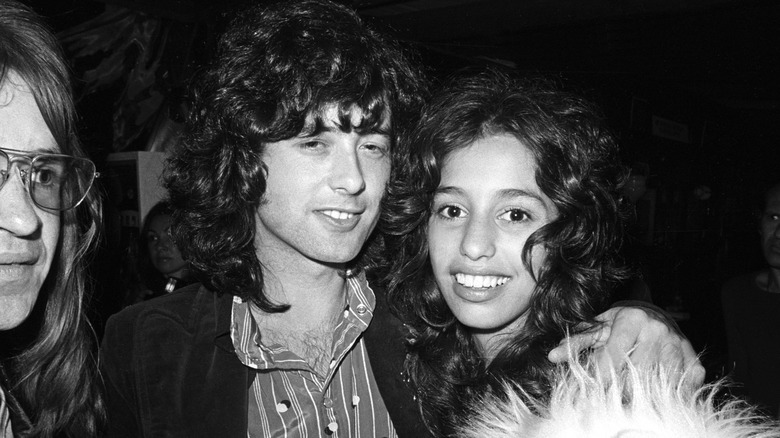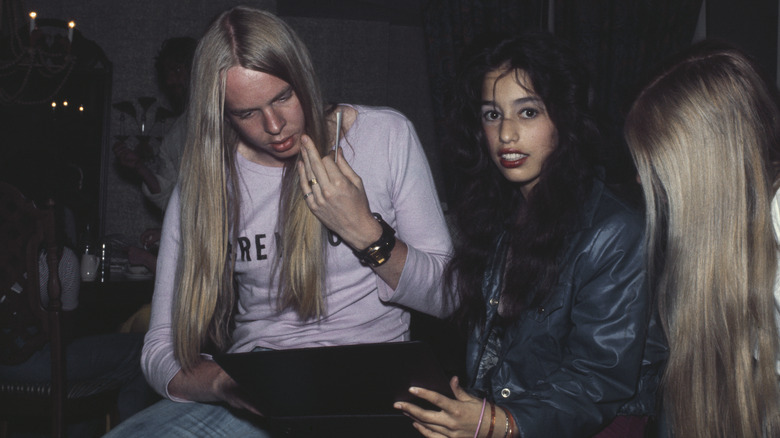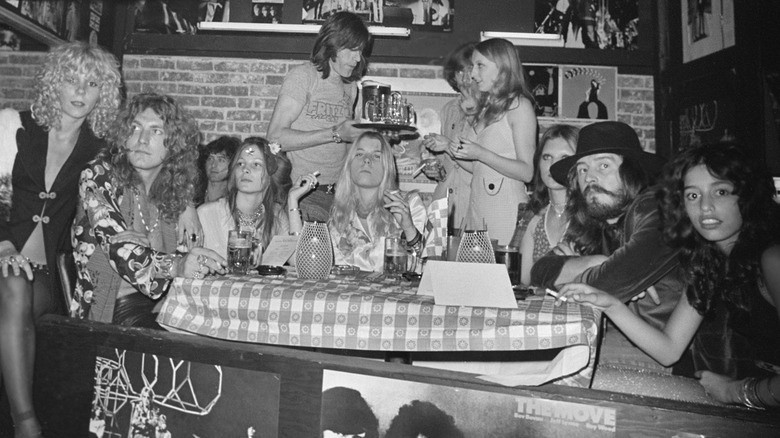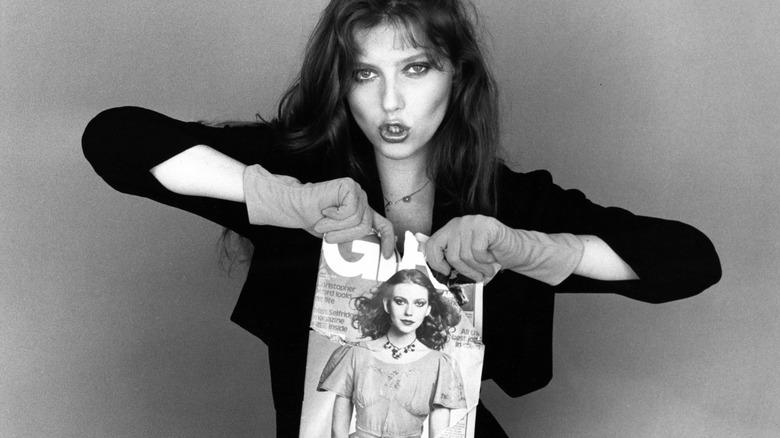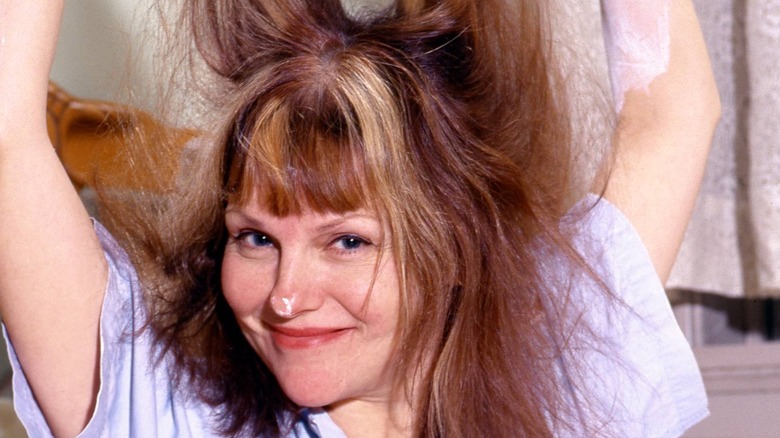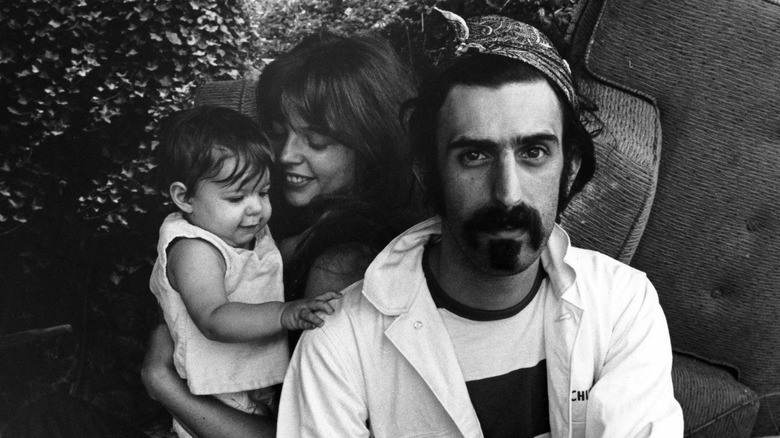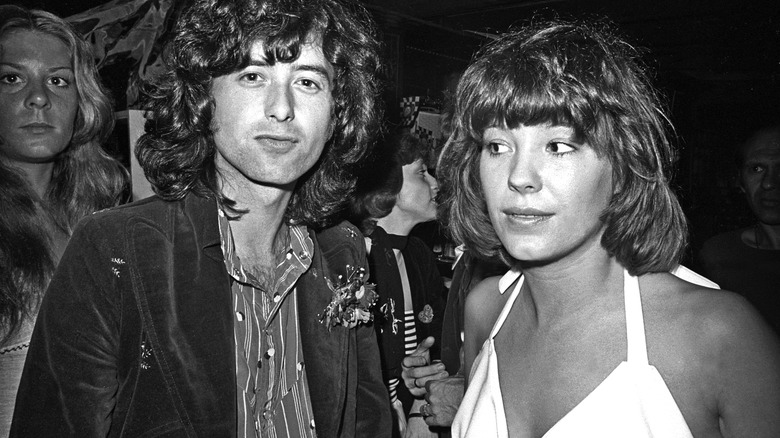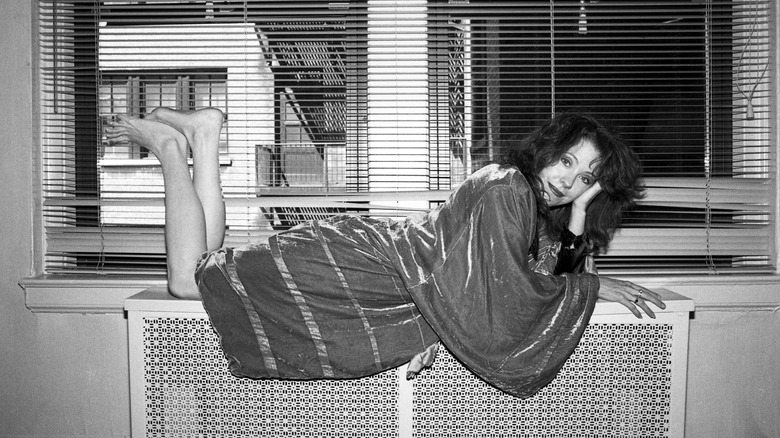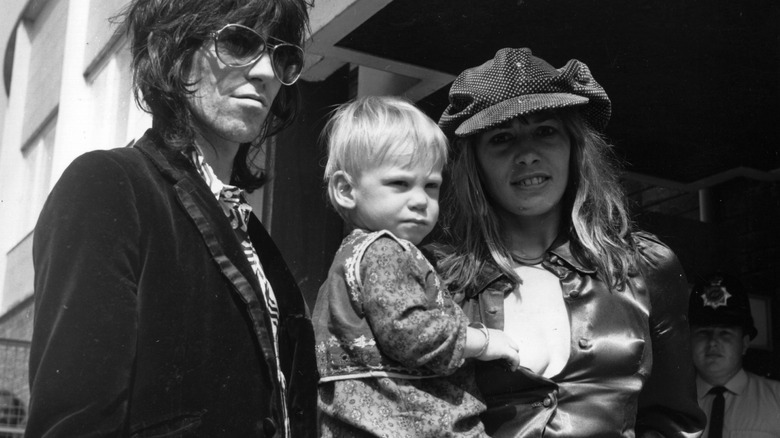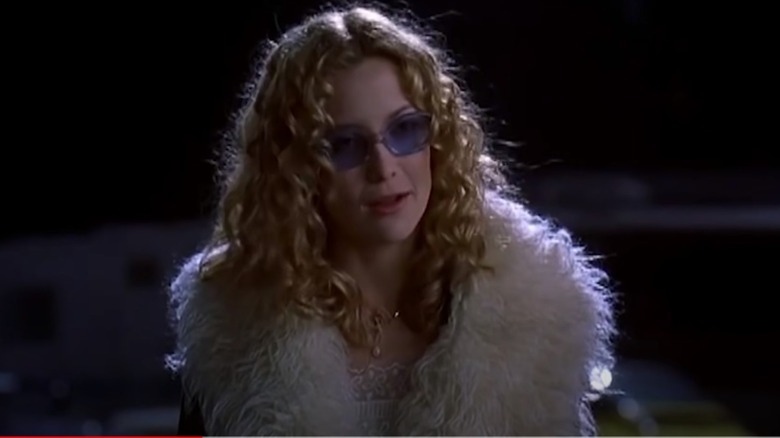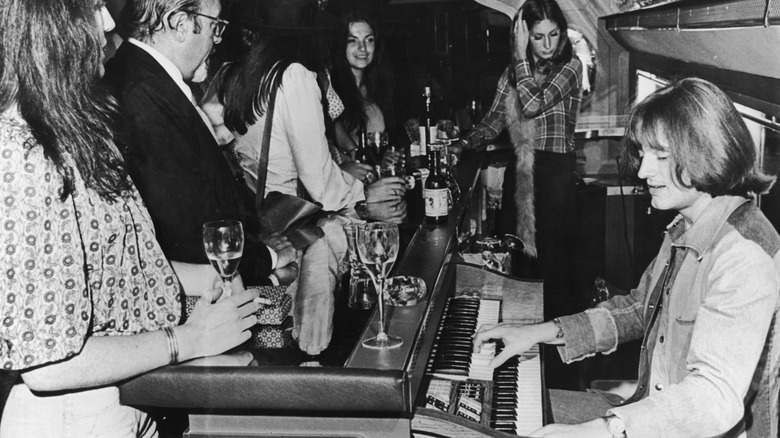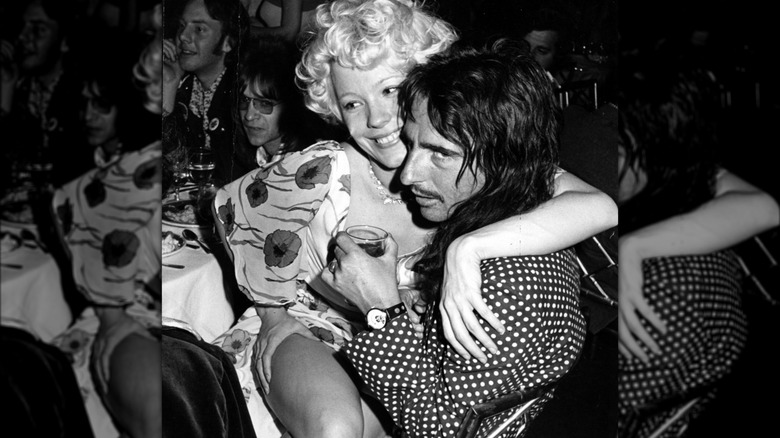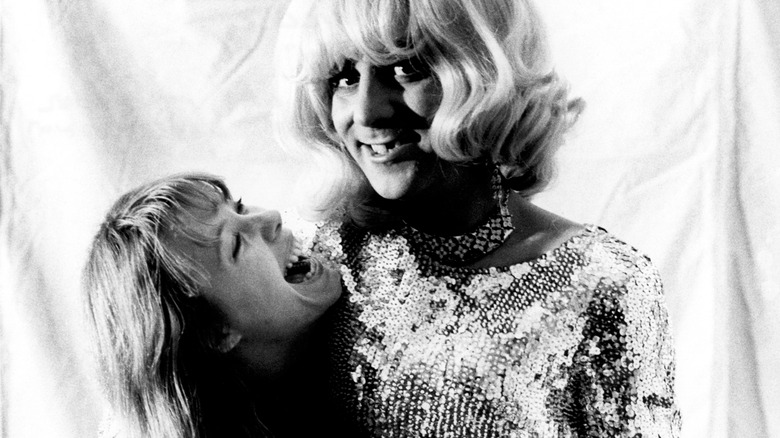What Being A Groupie In The 1970s Was Really Like
Fans of classic rock have probably seen countless pictures of the groupies who invariably hung out with all the big bands: They're the unbelievably cool women who have backstage passes for every show ... and more. They're the ones hanging out in restaurants, lounging around in pools, and jetting around the world in the company of some of the biggest rock stars on the planet. Not a bad gig, right?
It turns out that the term "groupie" means different things to different people, and it's not always about sex — although that was sort of a given. In an interview with The Guardian, Pamela Des Barres explained, "A groupie is someone who loves the music so much she wants to be around the people who make it. A fan is content with an autograph or a look from the stage, or a selfie. A groupie takes the next step."
That makes it sound super romantic, but not everyone was a fan of the depiction of a groupie in a love-and-sex sort of way. Cherry Vanilla explained to Please Kill Me that even though she's one of the era's most famous groupies, she was much more than that. She was an artist, a writer, and a DJ, "But no matter what, they'll hang that tag [of groupie] on you because it's what intrigues them most." And Bebe Buell even wrote in her memoir, "Rebel Heart," that it wasn't so much about being a groupie, but that she preferred to think of herself as a muse. What's the truth? It's surprisingly complicated.
Age wasn't a concern in the era of the baby groupie
Understanding the 1970s-era groupie really starts with coming to terms with a very uncomfortable fact: Age really didn't matter, to the point where some were known as "baby groupies." When she sat down to talk to Thrillist, groupie mainstay Lori Mattix (also Maddox, pictured with Jimmy Page) described being in junior high when a friend introduced her to Sable Starr, who was already popular on the groupie scene by the time she was 14 years old. "She was so glamorous, totally one-of-a-kind, wearing scarves for shirts and going topless without hesitation," Mattix said. She continued, "I had not yet turned 15 and [David Bowie] wanted to take me to his hotel room."
She says she wasn't ready then, but five months later Starr and her sister were both involved with Iggy Pop yet lusting after Bowie, and this time, Mattix says that when Bowie's bodyguard says that he'd requested her presence at dinner — and afterward, in his bedroom — she agreed.
As for Starr, it was Iggy Pop who famously wrote about their relationship: "I slept with Sable when she was 13, Her parents were too rich to do anything, She rocked her way around LA," he sang. By the time they were together, Starr had already been in a sexual relationship with Spirit's guitarist. By 14, she was a staple at Whiskey A Go Go, and a favorite of Jimmy Page. And for Iggy Pop? He also hooked up with her younger sister, Corel.
If you or anyone you know has been a victim of sexual assault, help is available. Visit the Rape, Abuse & Incest National Network website or contact RAINN's National Helpline at 1-800-656-HOPE (4673).
The dynamic is still seen as incredibly complicated
When Thrillist talked to Lori Mattix (pictured, with Rick Wakeman) about becoming a sexually active groupie when she was still a young teen, she stressed that she didn't see anything wrong with it. "I was an innocent girl, but the way it happened was so beautiful. .... Who wouldn't want to lose their virginity to David Bowie?" she explained.
Fellow groupie Pamela Des Barres said similar things in an interview with The Guardian, saying that she was proud of Mattix for the way she handled all the negativity: "That's what she wanted. Yeah, she was young. ... But it was our reality, and everyone was OK with it." Writing in Big Issue, Des Barres says she has no regrets, and even says that she considered herself a pioneering feminist.
Others strongly disagree. Dr. Rosemary Lucy Hill of the Centre for Interdisciplinary Gender Studies at the University of Leeds told The Guardian that even if young women went into the world of the groupie with the mentality that all sex was consensual, the power imbalance makes it difficult. She explains: "...some people think it's never a free choice because of all the expectations. I think both of these things are true at the same time — and that makes it really complicated." Roxana Shirazi agreed: The Guns N' Roses groupie added, "It's never possible to have full agency [as a groupie]. From the outset, the power structure is not equal. ... you're not on the same plane."
Some musicians have shared a different interpretation
There's definitely no shared rule governing shared experiences that made life as a 1970s groupie the same for everyone, even those in shared situations. When Lori Mattix spoke with Thrillist about Jimmy Page, she said, "He mesmerized me. I fell in love instantly. ... At that point, I was 15 and totally in love with this man. I put him on a pedestal."
Page, however, shared a pretty different take on groupies, telling journalist Ellen Sander (via the Independent), "Girls come around ... teasing and acting haughty. If you humiliate them a bit, they tend to come on all right after that. Everybody knows what they come for, and when they get here, they act so special. I haven't got time to deal with it." (This, remember, is the same group that reportedly defiled a young groupie with pieces of a shark, in a story that Rolling Stone couldn't confirm or debunk.)
They were far from the only ones to think less than highly of groupies. Even '70s-era boy band The Bay City Rollers looked back on their groupies with a sort of a shrug and a laugh. In a 2015 conversation with the Irish Mirror, Les McKeown shared that he'd found his decades-past relationships with groupies "a bit shallow, compared to the depth of the relationship you have with your wife," and joked that they'd had girls lined up in every city. According to Stuart Wood: "One in every port, that was the expression."
The danger and fear was definitely there
Groupie Cherry Vanilla told Please Kill Me that for her, she never felt forced to do anything. She said that everything she participated in was done because she wanted it to happen, but not all 1970s-era groupies have had that experience.
Morgana Welch was one of the underage, LA-based groupies known as the LA Queens, and even though she told Please Kill Me how incredible she found the music scene, she admitted that along with the musicians tended to attract hangers-on who were looking for things that weren't as consensual as they were for the rich and famous. "A lot of girls buddied up," she said. "In a way, it felt a little safer, because you had somebody. You didn't always want to go alone." But that, too, didn't always work: She said that she and her friend, Tyla, were kidnapped, arrested as sex workers, drugged, and sexually assaulted.
Groupie Bebe Buell famously became the mother of Steven Tyler's daughter, Liv. According to her memoir, "Rebel Heart," she was pregnant and torn between Tyler and her old flame, Todd Rundgren, when Tyler's behavior became so erratic that it terrified her. She recounted seeing him have a massive seizure, recovering the following morning, and using cocaine again that evening. "I had to get out of there," she wrote. "'I'm really scared,' I whispered to Todd over the phone. 'Help me get out of here. I have to get away from this guy.'"
Some groupies turned their gimmicks into art
It makes sense that some of the most devoted groupies of the 1970s were artists themselves, and perhaps the most famous was Cynthia "Plaster Caster" Albritton. She's said (via The Age) that her decades-long career made of creating plaster casts of rock star genitalia started first with an art class assignment and continued with the realization that not only did having a gimmick get her noticed over other groupies but got her interacting with the scene's biggest stars in a completely different way.
What started as a gimmick earned her Frank Zappa's patronage (but not participation). Albritton says that while she initially relied on the help of other groupies to prepare stars for having casts taken, she eventually moved along to enlisting the help of significant others — and says that the interaction that came with the project was a unique insight into the perception of the groupie.
Albritton has admitted, "I was just doing it to get laid because I was goofy," and has also said that while her work was largely positive, she saw the dark side of being a groupie, too. When she described her encounter with Led Zeppelin, she said, "It was a horrible experience. They had a condescending attitude to some of the girls, coupled with a violent streak. Most bands have been humble, feet on the ground, and not blatant megalomaniacs." Albritton died in 2022, and her collection is now part of Indiana University's Kinsey Institute.
Gail Zappa and the groupie state of mind
While fans might see just the image rock stars project, groupies getting up close and personal see way more... for better or worse. Gail Sloatman was a 1960s groupie turned 1970s rock star wife, in spite of what she described (via The Sydney Morning Herald) as husband Frank Zappa's questionable personal hygiene. When she was interviewed by fellow groupie Pamela Des Barres for her book, "Let's Spend the Night Together," she spoke about what she called "the groupie state of mind."
She explained, "There was the negative side of groupies who only wanted to be with groups for the lifestyle." She said that she had known scores of groupies who "took groupiedom to a whole other level that you might call 'professional'. Groupies who just got lucky — girls servicing the band. Then there were the desperate ones servicing the crew or anyone near the band — cousins, road managers, whatever."
Gail Zappa, though, felt something else and saw the same thing in countless other groupies. For her, she had always felt like an outsider, but when a party for the up-and-coming Rolling Stones introduced her to an entirely different scene than what she'd grown up experiencing with her diplomatic, nuclear physicist father, she said that it was the idea of being understood, breaking free of constraints, and making her own way in the world that really attracted her to the life of a groupie.
Rock star trauma
In her autobiography, "Take Another Little Piece of My Heart," Pamela Des Barres (pictured, with Jimmy Page) wrote about learning that it wasn't always about sex. She said that the time Mick Jagger invited her back to the hotel to join the group after the ill-fated concert at Altamont, she hadn't even realized that he wanted to talk about the concert and his thoughts of walking away from music.
Des Barres also wrote of her experiences with Keith Moon, who was haunted by a January 1970 accident in which he hit and killed his driver in a frenzied escape from angry pub-goers. She told Louder Sound that after the accident, he had become deeply unhappy: "He said a lot of times, 'I don't deserve to live. I'm a murderous f***.' Screaming and wailing in the middle of the night. You'd have to comfort him and give him a lot more placidyls to make him go back to sleep."
She's been candid, too, about the fact that the life of a groupie isn't all glitz, glamor, and limousines. Toward the end of her memoir, she wrote of the friends that she had lost: A beloved companion and confidant named Beverly, to a heroin overdose. Rock gods she considered friends — Keith Moon, Jimi Hendrix, Mama Cass, Gram Parsons. She wrote about almost ruining her own health worrying about others, saying that in the end, she had finally come to a heartbreaking conclusion: "There was nothing I could do."
If you or someone you know needs help with mental health, please contact the Crisis Text Line by texting HOME to 741741, call the National Alliance on Mental Illness helpline at 1-800-950-NAMI (6264), or visit the National Institute of Mental Health website.
Some groupies loved the perfectly ordinary
For some groupies, things didn't end at the door of the nightclub: Some were invited into the perfectly ordinary, everyday lives of the rock stars whom they hit it off with. In her memoir, "I'm With the Band," Pamela Des Barres wrote about meeting Gail Zappa and being fascinated with the idea that even rock stars like Frank Zappa could have families, drink tea, and enjoy breakfast in their own kitchens. Gail offered her friend a job as nanny for their daughter, Moon, and her brother, Dweezil.
She wrote, "The love I felt for them was different from any other kind. I didn't want a single thing from those munchkins, and it was a refreshing relief. I hung out with them because I had to but found out real soon that I also wanted to." She made them breakfast, changed diapers, and moved in with the Zappas in Laurel Canyon.
Morgana Welch has also spoken about the ordinary side of being a groupie. She told Please Kill Me that groupies' contributions to the music scene were never appreciated. She recounted cooking for countless bands: "I had certain recipes, like these massive stir-frys, where I could feed the band and the roadies for five bucks. They were always so grateful, because they were broke and starving. So in a way, a lot of groupies were ... doing things to help these guys stay alive while they did their music."
They saw fashion as thrift store art that ultimately influenced music
Being a groupie in the 1970s meant trying to get noticed by one's rock star of choice, and that meant getting creative with fashion. For the decade's groupies, it was more than just clothing: Morgana Welch explained to Please Kill Me that "Our art was fashion. Ambient art." She said that thrift stores were their go-to, as it allowed them to piece together outfits with complete control and no limit to creativity.
Pamela Des Barres spoke with Vogue about the groupie fashion sense, saying that it was incredibly important to her: "I just wanted to be understood by the way I looked." Getting ready for going out was just as big a deal as actually going out, and she recalled spending hours putting on makeup and decorating herself with sequins. "I wanted to express myself along with all these people I admired so much."
She added that part of what she did as a groupie was to take bands shopping when they were in town and to make them some of the clothes that ultimately shaped their style. At the forefront of that was Anita Pallenberg (pictured), who's widely credited with changing the entire look of the Rolling Stones as they stepped into the 1970s. Even Keith Richards gave her a shout-out in his memoir, "Life," (via The New York Times), saying, "I started to become a fashion icon for wearing my old lady's clothes."
Is Almost Famous an accurate representation of life as a 1970s groupie?
It's impossible to talk about what it was like to be a groupie in the 1970s without talking about Cameron Crowe's iconic "Almost Famous." The Kate Hudson film was based on his own experiences as a journalist at the time, but according to what Pamela Des Barres told Vulture, that's precisely what the problem with it is. Being a groupie, she explains, was all about feminism and the female agenda, and the fact that the movie is told from the perspective of a male journalist is something that she took major issue with.
"[Penny Lane] was not owning herself, not owning groupiedom and what it actually means," she explained. "...[The film is a] horribly misogynistic look at what a groupie-muse is. That made me so angry. This character, the groupie like she's portrayed, is pathetic." Des Barres takes particular issue with Penny Lane's suicide attempt, saying that no true groupie would have been so tied up in the idea of the man. Instead, she says it was always about the music.
Des Barres was so outraged by the depiction of her life — one that she called "tepid" — that she actually confronted Crowe about it. She said "he basically dismissed me" but years later, "he sort of apologized." One of her biggest beefs? "[The tour bus scenes were] too cutesy and too clean for what really would have happened in that bus had I been on it."
Tour buses? Not so much
Among the problems that 1970s-era groupie Pamela Des Barres had with Cameron Crowe's "Almost Famous" was what she described to Vulture as the "too cutesy" bus scenes. For starters, she says that during her time as a groupie, it wasn't a bus at all: "I was on jets." For many, that meant getting a ride on the Boeing 720B dubbed Starship I. The jet was first chartered by Led Zeppelin in 1973, and it retired just four years later after hosting Peter Frampton. Those years in between, though? It saw a lot.
Billboard says that the general vibe of the plane could be summed with the idea of band names being spelled out on the bar in lines of cocaine and a bedroom complete with an often-used waterbed. When Alice Cooper leased the plane, nightly activities would be recounted in the form of "ball scores." Others found the jet handy for other reasons: According to The New York Times, Jimmy Page used it to transport then-underage groupie, Lori Mattix, across state lines.
Deep Purple chartered the plane, too, and according to what manager Bruce Payne saw, it was one of the band's go-to methods for courting groupies. "The girls would get on the plane and fly to wherever the next show was. Fathers two states over were calling the cops," he recalled. Parties went on 24/7 no matter what the city, and drummer Ian Paice had other things on his mind: "The Starship was a great place to join the mile-high club."
Taking on jobs they should have been paid for
Pamela Des Barres told Fashion that she's been on a quest to take back the word "groupie" from anyone who might use it to paint a picture of one-dimensional, sex-obsessed women throwing themselves at rock stars. And even though Des Barres might condemn "Almost Famous" as a shallow depiction of what life was like, it's not entirely wrong.
In fact, it depicts precisely what Des Barres has been saying: Penny Lane starts talking to the character inspired by Cameron Crowe, and gets him access to the band. According to Dr. Paula Harper, a postdoctoral fellow in musicology at the University of Washington in St. Louis, that was pretty regularly a part of the groupie's life.
Harper went on to explain that groupies knew all the places to be seen, and who was going to be having the best parties. When out-of-town bands showed up for a few shows, it was the groupies who made connections. Harper goes as far as to suggest that not only were they acting as adept and experienced PR people, but that if their work had been carried out by a man, they would have gotten paid. Take Gail Zappa: She had not yet married her famous husband when she and her groupie friend traveled California, taking The Who's "My Generation" to radio station after radio station. She said that although it was all in fun, they ended up breaking the record into radio play — and that's the sort of thing people normally get paid for.
Groupies, girlfriends, and wives
Groupie Pamela Des Barres says (via Fashion) that there's absolutely nothing wrong with the type of groupie who's only out to add notches to their bedpost. "You're not hurting anyone. If that's what you want to do, do it." But here's the thing: Some of the wives and girlfriends of rock stars have spoken out about the harm that the groupie lifestyle has done to them.
Des Barres interviewed groupie-turned-wife Gail Zappa for her book, "Let's Spend the Night Together," and she confirmed that yes, her husband was a huge fan of the groupie sex scene even after they were married, and it absolutely bothered her. "Well, everyone had groupies. I mean, you couldn't get around them. There are aspects that were not easy and not fun, and it's not like you could be consoled or cry on his shoulder over it. But what doesn't kill you makes you stronger."
Franka Wright shared her heartbreaking story to The Daily Mail. Longtime wife of Pink Floyd keyboardist Rick Wright, she confronted her husband and his groupie-of-choice, only to learn that she was expecting his child. The news, she revealed, came immediately on the heels of Franka's fourth miscarriage. Those miscarriages, she said, came because she flew along with him when he toured: "If I wasn't there when he wanted me, then he would find another woman to put in his bed. ... [His affairs were] a bed of thorns that cut into my heart every day and almost destroyed me as a woman."
Were there regrets? For some it was the drugs
According to Morgana Welch, she would go back to the days of free love and baby groupies in a heartbeat. It's an era that could never be replicated, and she said (via Please Kill Me) that the reason for the change was twofold: After the AIDS crisis and the emergence of cocaine as a drug of choice, she says "[we] went from expressing yourself to feeding the ego." She added that she had gotten clean: "I don't want to be out of it. I want to be there for it."
It's something that other groupies grew into feeling as well. Pamela Des Barres told Big Issue that if she had any advice for her younger self, it would be to lay off the drugs. "The early drugs were fine — pot and acid, mescaline and all — ... Then it sort of denigrated into cocaine and pills and stuff. I'd tell [my younger self] to avoid some of that, because there are things I don't remember because I was so high."
In her memoir, "Rebel Heart," Bebe Buell also told some terrifying stories about drug use. In one, another groupie who was dating Alice Cooper at the time had given her elephant tranquilizers. She wrote, "I called Todd [Rundgren] on the phone as I was starting to die." She told another story of swearing off heroin for life, writing that it was such a bad experience that she had no doubts that she was never going to touch it again.
If you or anyone you know needs help with addiction issues, help is available. Visit the Substance Abuse and Mental Health Services Administration website or contact SAMHSA's National Helpline at 1-800-662-HELP (4357).
